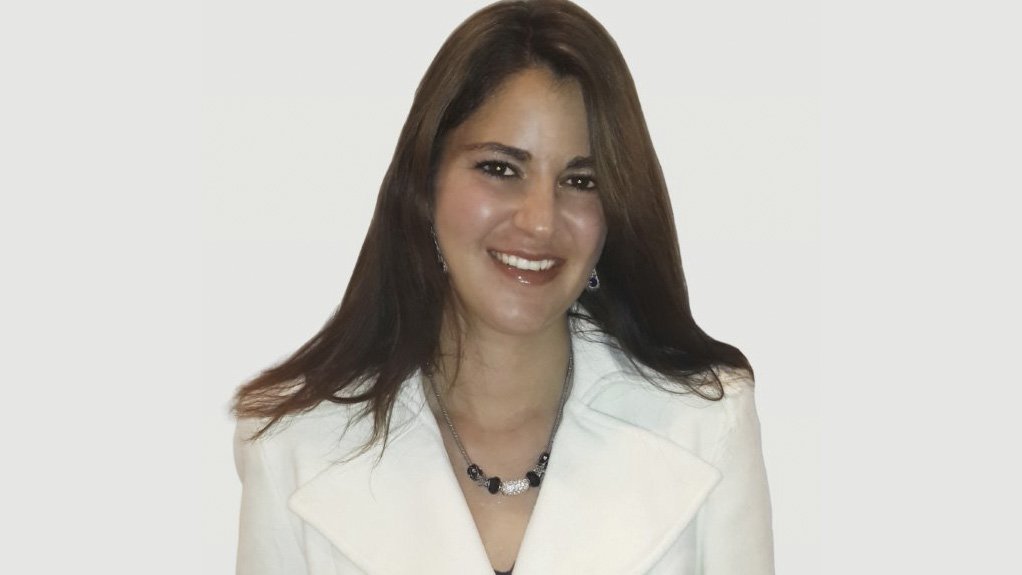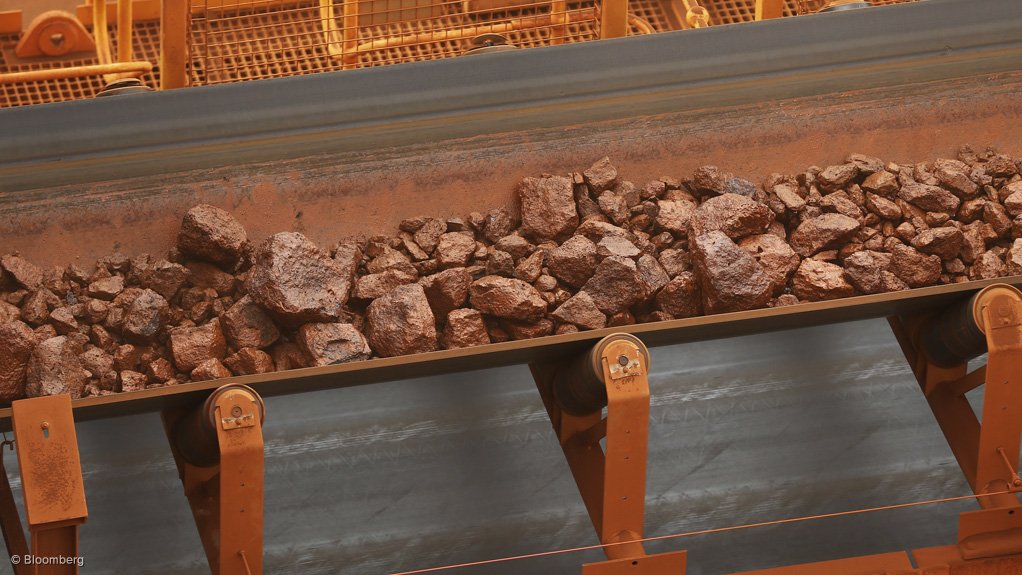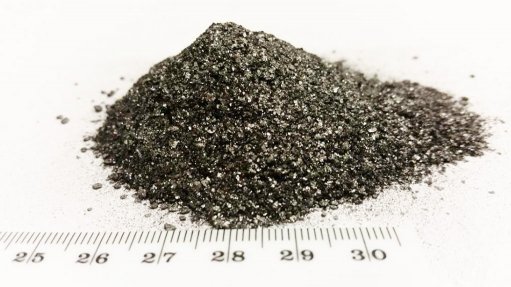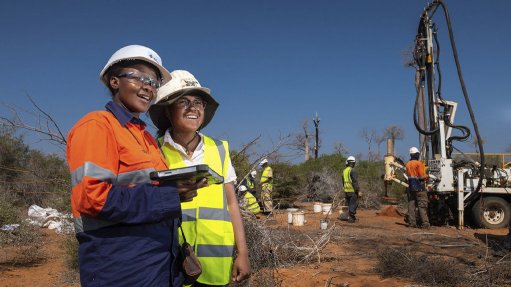South African iron-ore industry remains weak



LARA SMITH It is not clear if the commodity super cycle will return in the near or medium term, but there are signs of improvement and some acquisition activity
INDUSTRY TRENDS There has been an increased focus on smelting, refining, manufacturing and trading as it has proven to be more profitable
Photo by Bloomberg
Stagnating growth in China and low domestic demand continue to pressure the iron-ore mining industry in South Africa, which needs a coordinated approach by government and the private sector to attract investment, states privately owned consultancy Core Consultants.
Political uncertainty and possible mining reforms, such as the amendments to the Mineral and Petroleum Resources Development Act, are not aiding the South African iron-ore industry, which is dealing with the “major challenge” of a relatively depressed current iron-ore spot price of of $72.23/t.
Additionally, there is the country’s political uncertainty, for example, the Economic Freedom Fighters leader Julius Malema’s ‘land grab’ talk in conjunction with the National Prosecuting Authority’s threat to charge Finance Minister Pravin Gordhan with fraud, which Core Consultants emphasises is too much uncertainty for investors to consider putting their money into fixed projects in this country.
In addition, despite some improvement in the price over the last six months, the South African iron-ore industry will not soon find relief, as the uncertain direction of China’s economy and low global growth is not supporting any upward move in demand, adds the company.
“It is not clear if the commodity supercycle will return in the near or medium term, but there are signs of improvement and some acquisition activity,” Core Consultants founder Lara Smith tells Mining Weekly.
BEE Hurdle
In addition, she adds that there is also uncertainty surrounding the level of black economic empowerment (BEE) required by mining companies, with foreign investors concerned about investing and later needing to dilute shareholders’ value to comply with BEE requirements.
Smith highlights a government proposal that came out in August that the biggest mining firms must give 1% of their annual revenue to developing communities. “This is 1% over and above the social and labour plans that mining companies have to submit to retain their licences,” she emphasises.
Subsequently, there have been discussions between the Department of Mineral Resources and the Chamber of Mines with respect to the Mining Charter, which has for years mandated measures designed to boost black participation.
The policies are regarded by potential investors as a “regressive imposition”, especially on those mining projects that are marginal and should rather be assessed on the basis of profitability than revenue.
As BEE has been tainted by corruption, it does nothing to attract investment to the country or boost the economy. “The redistribution [of wealth] without growth is an exercise in futility as it is unsustainable,” states Smith.
Transport Hurdle
Core Consultants explains that logistical infrastructure is also a challenge in the iron-ore industry, as some projects in the Northern Cape, home to the largest, and rich, iron-ore reserves in South Africa, struggle to transport iron-ore from pit to port, owing to the lack of rail networks.
This lack of, or inadequate, logistical infrastructure often renders a project uneconomical and, therefore, eradicates its viability rather than the usual factors such as geology, securing end-users or price.
Smith explains that South Africa has a limited local market and small- to medium-sized producers, only realistically being able to sell to integrated steel and mining company ArcelorMittal South Africa, resulting in the need to export iron-ore. Admittedly, she says, the State is deeply engaged in offering the domestic steel sector support.
Lessons in Crossing the Finish Line
However, she says in the seaborne market, “you are competing with established iron-ore players” such as Australia and Brazil.
Australia is the world’s largest iron-ore exporter and the second-largest producer, accounting for around one-third of global production.
Western Australia holds just over 90% of Australia’s identified iron-ore resources and has a reputation for producing consistently high concentrations of around 60%.
British-Australian multinational mining corporations Rio Tinto and BHP Billiton and iron-ore company Fortescue Metals Group account for about 90% of Australia’s iron-ore production.
However, large global producers such as Brazilian multinational corporation Vale have not been restrained by any means, notes Smith, and continue to mine at accelerated rates, with the larger South African producers following suit.
The cost-cutting measures implemented by most of these mining companies have added some margin, while share prices for small to medium-sized South African producers continue to reflect a relatively uncertain future.
Securing the Future
However, there has been an increased focus on smelting, refining, manufacturing and trading as it has proven to be more profitable.
Core Consultants adds that there is also a trend in South Africa towards applying technologies focused on reducing the energy consumption of processes at iron-ore mining operations and increasing the use of renewable-energy resources. This is driven by environmental and, other, more immediate cost concerns, says Smith, noting that many miners in South Africa and around the world have realised energy cost savings of around 10% to 30% through investments in renewable-energy technology.
She explains that the industry is also moving towards employing more automated mine processes, big data and machine learning to reduce labour cost components. Iron-ore miners are further considering increasing the use of prefabricated buildings for employee accommodation and storage, as this is less expensive than traditional brick and mortar.
Comments
Press Office
Announcements
What's On
Subscribe to improve your user experience...
Option 1 (equivalent of R125 a month):
Receive a weekly copy of Creamer Media's Engineering News & Mining Weekly magazine
(print copy for those in South Africa and e-magazine for those outside of South Africa)
Receive daily email newsletters
Access to full search results
Access archive of magazine back copies
Access to Projects in Progress
Access to ONE Research Report of your choice in PDF format
Option 2 (equivalent of R375 a month):
All benefits from Option 1
PLUS
Access to Creamer Media's Research Channel Africa for ALL Research Reports, in PDF format, on various industrial and mining sectors
including Electricity; Water; Energy Transition; Hydrogen; Roads, Rail and Ports; Coal; Gold; Platinum; Battery Metals; etc.
Already a subscriber?
Forgotten your password?
Receive weekly copy of Creamer Media's Engineering News & Mining Weekly magazine (print copy for those in South Africa and e-magazine for those outside of South Africa)
➕
Recieve daily email newsletters
➕
Access to full search results
➕
Access archive of magazine back copies
➕
Access to Projects in Progress
➕
Access to ONE Research Report of your choice in PDF format
RESEARCH CHANNEL AFRICA
R4500 (equivalent of R375 a month)
SUBSCRIBEAll benefits from Option 1
➕
Access to Creamer Media's Research Channel Africa for ALL Research Reports on various industrial and mining sectors, in PDF format, including on:
Electricity
➕
Water
➕
Energy Transition
➕
Hydrogen
➕
Roads, Rail and Ports
➕
Coal
➕
Gold
➕
Platinum
➕
Battery Metals
➕
etc.
Receive all benefits from Option 1 or Option 2 delivered to numerous people at your company
➕
Multiple User names and Passwords for simultaneous log-ins
➕
Intranet integration access to all in your organisation




















